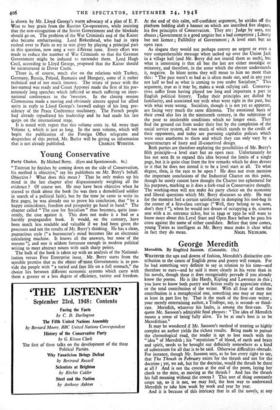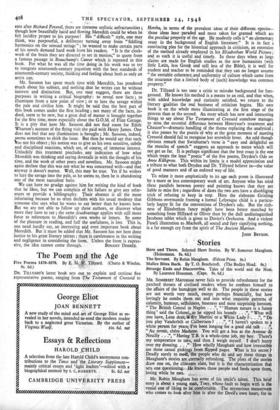George Meredith
Meredith. By Siegfried Sassoon. (Constable. 15s.) WHATEVER the ups and downs of fashion, Meredith's distinctive con- tribution to the canon of English prose and poetry will remain. For he had something very definite to say in relation to his time—and therefore to ours—and he said it more clearly in his verse than in. his novels, though these it does recognisably pervade if you already know the poems. He is like Hardy, Kipling and Lawrence in this ; you have to know both poetry and fiction really to appreciate either, or the total contribution of the writer. With all Sour of them the contribution is a metaphysical one, something one may or may not at least in part live by. That is the mark of the first-rate writer ; your merely entertaining author, a Trollope, say, is second- or third- rate. Meredith, whatever his faults, is among the first-rate. To quote Mr. Sassoon's admirable final phrases: "The idea of Meredith means a sense of being fully alive. To be at one's best is to be Mereciithian."
It may be wondered if Mr. Sassoon's method of treating so highly complex an author yields the richest results. Being made to pursue the chronological road, the reader is apt to lose touch with the " idea " of Meredith ; his "mysticism" of blood, of earth and brain and spirit, needs to be brought out definitely somewhere as a kind of substratum for all that is to be said. Otherwise difficulties obtrude. For instance, though Mr. Sassoon says, as he has every right to say, that The Thrush in February exists for the thrush and not for the doctrine ; yet, we ask, but for the doctrine, would the thrush be there at all ? And is not the crocus at the end of the poem, laying her cheek to the mire, as moving as the thrush ? And has the thrush his full meaning without the crocus ? This sort of thing constantly crops up, so it is not, we may feel, the best way to understand Meredith to take him work by work and year by year.
And it is because of this intricacy that in all the novels, at any
rate after Richard Feverel, there are tiresome stylistic anfractuosities ; though how beautifully lucid and flowing Meredith could be when he felt lucidity proper to his purpose! His " difficult " style, one may think, was purposeful, a deliberate turning away from "fiddling harmonics on the sensual strings " ; he wanted to make certain parts of his novels demand hard work from his readers. "It is the clock- work of the brain they are directed to set in motion," to quote from a famous passage in Beauchamp's Career which is repeated in this book. For what he was all the time doing in his work was to try to integrate nineteenth-century paganism with the best standards of nineteenth-century society, thinking and feeling about both as only an artist can.
Mr. Sassoon has spent much time with Meredith, has pondered much about his subject, and nothing.that he writes can be without interest and distinction. But, one may suggest, there are three purposes in writing a critical biography : to reveal new facts • to illuminate from a new point of view; or to lure the savage within the pale and civilise him. It might be said that the best part of this book comes under the first heading ; not many of the facts, in- deed, seem to be new, but a great deal of matter is brought together for the first time, more especially about the G.O.M. of Flint Cottage. It is a pity that here Mr. Sassoon _ did not find room for Edith Wharton's account of the flying visit she paid with Henry James. One does not feel that any illumination is brought ; Mr. Sassoon, indeed, seems sometimes to shirk the issue. But then he would say that such .vas not his object ; his notion was to give us his own sensitive, subtle and disciplined reactions, which are, of course, of immense interest. Unluckily this treatment precludes any indication of how what Meredith was thinking and saying dovetails in with the thought of his time, and the work of other poets and novelists. Mr. Sassoon might again declare that this was not what he was concerned with—and that anyway it doesn't matter. Well, this may be true. Yet if he wishes to lure the savage into the pale, as he seems to, then he is abandoning one of the most succulent baits.
We can have no grudge against him for writing the kind of book that he likes, but we can complain of his failure to give any refer- ences or provide a bibliography. Their absence is all the more infuriating because he so often declares with his usual modesty that someone else says what he wants to say better than he knows how. But we are not able to follow up these authors, or discover what more they have to say ; the same disadvantage applies with still more force to references to Meredith's own works or letters. So some of the pleasure in reading, and half the usefulness, is lost. This is, one need hardly say, an interesting and even important book about Meredith. But it must be added that Mr. Sassoon has not here done justice to his great literary talents ; there is carelessness in the writing and negligence in considering the form. Unless the form is expres- sive, the idea cannot come through. BONAMY DOBREE.



































 Previous page
Previous page